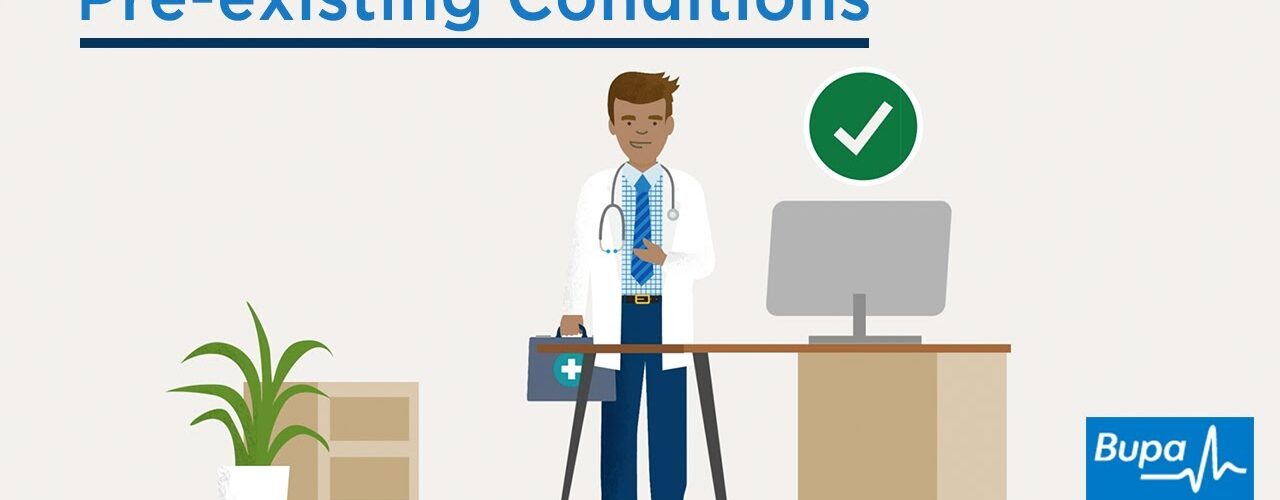The rising cost of health insurance today often feels overwhelming and can be difficult to understand. Knowing how pre-existing conditions can impact your health insurance coverage can be even more challenging. This blog article will discuss the impact that pre-existing conditions have on health insurance and give insight into finding coverage for them. We’ll discuss how pre-existing conditions affect premiums & costs, access to care, out-of-pocket costs and health savings accounts. By understanding the implications of pre-existing conditions, you will be better able to make decisions about your health insurance coverage. So let’s dive into the impact of Pre-Existing Conditions on Health Insurance.
Definition of Pre-Existing Conditions

Health insurance companies use the term “pre-existing conditions” to refer to medical conditions that exist prior to applying for a health insurance policy. Conditions such as diabetes, hypertension, cancer and asthma can be considered as pre-existing and are often excluded from a health insurance policy. Generally, any medical condition that can be diagnosed and has been treated within the past 12 months is classified as a pre-existing condition. This means that the insurer may not cover any medical expenses associated with the previous diagnosis or treatment of the pre-existing condition. It is important to note that individual insurers may include additional definitions of pre-existing conditions that are not addressed in this definition. Additionally, some insurers may also exclude coverage for any pre-existing conditions occurring within the first six months of issuing a policy.
How Do Pre-Existing Conditions Affect Health Insurance Coverage?
Pre-existing conditions can often have a significant effect on health insurance coverage and premiums. These conditions can range from hereditary illnesses to chronic diseases, and can be caused by lifestyle choices or environmental factors. In many cases, individuals with pre-existing conditions may be more likely to be denied coverage or be offered coverage with increased premiums and limitations. This can make it difficult to get affordable insurance and to access the care they need for their condition.
Unfortunately, pre-existing conditions can still limit access to health insurance in some areas. Insurance providers may use their own criteria to determine whether or not a pre-existing condition is covered or qualify for certain types of coverage. In most places, some coverage for pre-existing conditions is mandated by law. It is important to check what is available in your specific area.
In many cases, individuals with pre-existing conditions can find coverage through governmental and non-governmental providers. Government sponsored plans like Medicaid may cover pre-existing conditions, while private insurance plans may vary in their level of coverage. It is important to research your options before signing up for any plan.
Finding health care coverage that meets your needs and fits your budget can be challenging, especially if you have a pre-existing condition. Understanding your options and local regulations can help you to find the best option for you and ensure that your medical needs are met.
Impact on Premiums & Costs
How Pre-Existing Conditions Affect Your Health Insurance Options
This can be a source of worry when it comes to health insurance. The medical costs associated with such a condition might make accessing health insurance coverage difficult and acquire higher premiums or costly co-pays. Before wholly understanding the impact that pre-existing conditions have on health insurance premiums and costs, let’s delve into what these conditions are and how they are defined. Pre-existing conditions are medical conditions that existed prior to an insurer providing coverage. Conditions such as asthma, diabetes, cancer, and heart disease are some of the most commonly recognized pre-existing conditions. Disabilities and chronic illnesses, such as depression and HIV/AIDS can also fall in this category.
The effect that pre-existing conditions have on premiums and costs largely depend on the type of insurance purchased and the laws of the state. Before the Affordable Care Act (ACA), insurers used to deny insurance coverage to individuals who had pre-existing conditions, or if coverage was given, extra charges, exclusions, or limitations were applied. The ACA banned insurers from denying coverage and charging more for pre-existing conditions. However, purchasing health insurance on an individual, or non-group plan, may still lead to exorbitant premiums, depending on the severity of condition and the insurance plan purchased.
For more information about the impact of pre-existing conditions on premiums and costs, readers may find this guide from HealthInsurance.org helpful. It provides an overview of the topic, along with advice on how to find affordable health insurance with pre-existing conditions.
Impact on Access to Care

The effects of chronic health conditions on access to health care must not be underestimated. They can, in some cases, greatly reduce the amount and quality of care available. In most cases, insurance companies are unable to cover the cost of pre-existing condition care due to the additional costs of providing such care. This can make it hard for individuals to afford the necessary treatments, often leading to increased out-of-pocket expenses and/or postponement of needed care.
Furthermore, it can be difficult for individuals with Underlying health conditions to find insurance providers willing to cover them. This lack of options can mean that health plans with higher cost, narrower coverage, and higher deductibles are the only options. Ultimately, pre-existing conditions can lead to more difficult access to care, as well as decreased affordability and quality.
The consequences of barren access to pre-existing condition care can be dire. Without the necessary treatments, individuals with Prior medical conditions may experience worsened health, leading to greater issues down the line. In addition, they may be unable to pay for premiums or treatments, leaving them unable to access regular care. In the most extreme cases, lack of access to care can be life-threatening. These risks must not be taken lightly, and the importance of keeping health insurance coverage accessible and viable for all should not be underestimated.
Impact on Out-of-Pocket Costs
Those with pre-existing conditions know that out-of-pocket costs can be substantially higher. Doctors’ visits, medication, treatments, and tests must be paid for by patients, and insurance typically has lower coverage for those with Underlying health conditions. Surcharges may be added to premiums for those with existing health issues, and even when a healthcare policy is accepted, co-pays, co-insurance, and deductibles are higher.
Additionally, a pre-existing condition may result in coverage exclusions. This means that certain services related to the pre-existing condition may not be covered or only partially covered. It is important for individuals to make sure they understand their coverage carefully and to familiarize themselves with services that are considered out-of-pocket.
Discussing treatments and payment expectations with their health care provider can also play an important role in minimizing out-of-pocket costs. Those with pre-existing conditions must plan carefully to ensure that their health care is affordable, given the financial impact of these conditions.
Impact on Health Savings Accounts
The impact of pre-existing conditions on Health Savings Accounts (HSAs) is very important. For those with pre-existing conditions, an HSA may be the only way to access much-needed healthcare services. An HSA is an account designated solely for medical expenses and it offers individuals a triple tax advantage; contributions, income, and withdrawals are all tax-free. For someone with a pre-existing condition, an HSA allows them to receive the funds needed for medical costs and ensure that they get access to the right medicalcare.
Unfortunately, the eligibility requirements to participate in an HSA are often more restrictive than for other health insurance plans. This means that pre-existing conditions may result in someone being denied coverage or not being able to afford the higher premiums associated with an HSA.
Additionally, some existing health issues may be excluded from services covered by an HSA, such as certain medicines or treatments. Despite these limitations, HSAs offer a great option for those with pre-existing conditions who may have otherwise been unable to access quality health care.
How to Find Health Insurance for Pre-Existing Conditions
Finding appropriate health insurance for your pre-existing conditions can be tricky. Depending on your healthcare needs, there are a few different options for taking care of your health and finding coverage for existing medical problems. For starters, you’ll want to get in touch with any current or former employers you may have and inquire about any insurance plans they offer. Alternatively, you may be able to purchase a plan through a marketplace exchange via the government or a private company. These plans are typically offered in two forms: off-exchange and on-exchange. Off-exchange plans are purchased directly from an insurer, while on-exchange plans are purchased from an insurance broker or marketplace. The cost of exchange plans may vary depending on your age, location, religion, and other factors. Make sure to research the costs and coverage options available in your area before making a decision.
Additionally, you may also want to look into short-term plans, which often come with fewer rigid requirements and are typically less expensive, as they don’t provide the same comprehensive coverage that an individual health plan does. Short-term plans are typically renewable on a monthly basis and can be found through various online providers. Finally, high-deductible health plans may be worth researching if you’re looking for more affordable insurance. While monthly premiums are usually lower, these plans usually have higher deductibles than other plans. Ultimately, the best way to find health insurance for your pre-existing conditions is to go over your options and determine which plan best fits your budget and healthcare needs.
Pre-Existing Conditions – Conclusion
In conclusion, the financial and medical consequences of Existing health issues present an undeniable impact on health insurance coverage. From higher premiums, to limited access to care, to out-of-pocket expenses and health savings accounts, the ways in which this issue unfolds can have far-reaching consequences on an individual’s overall wellbeing. Nevertheless, in recent years, progress has been made with initiatives such as the Affordable Care Act and the Coronavirus Aid, Relief, and Economic Security Act (CARES) to mitigate the effects on those with Prior medical conditions. Although there is still much room for improvement, these steps go a long way in creating a better healthcare system for all.
Thanks for reading this article! If you found this interesting and are looking for more content related to the insurance industry, we suggest you check out our popular article about “Understanding the Role of Underwriters in Insurance” here!





